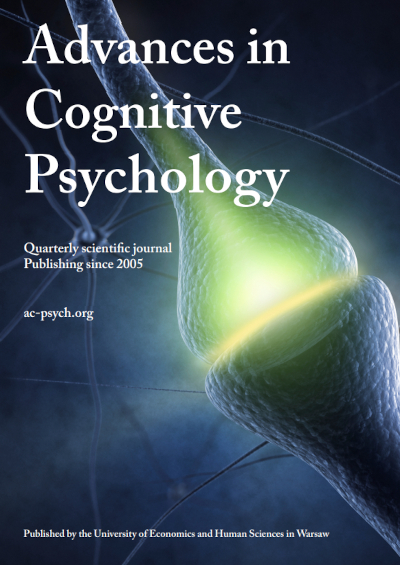Open Science Statement
Advances in Cognitive in Psychology wishes to enhance publication transparency and replicability by advocating the Guidelines for Transparency and Openness Promotion (TOP) in Journal Policies and Practices.
To this end, we advocate the following standards:
-
Citation Standards
All data, program code, and other methods should be appropriately cited. Such materials should be recognized as original intellectual contributions and afforded recognition through citation.
-
All data sets and program code used in a publication should be cited in the text and listed in the reference section
-
References for data sets and program code should include a persistent identifier, such as a Digital Object Identifier (DOI). Persistent identifiers ensure future access to unique published digital objects, such as a text or data set. Persistent identifiers are assigned to data sets by digital archives, such as institutional repositories and partners in the Data Preservation Alliance for the Social Sciences (DataPASS). Other viable online repositories are numerous, for example OSF, Zenodo, GitHub, Dryad, or Figshare.
-
Data set citation should be done according to the 7th version of the APA Publication Manual. Formatting and reference examples can be found on the APA Style Blog.
-
-
Data, Analytic Methods (Code) and Research Materials Transparency
Our policy is to publish articles in which authors indicate whether the materials, data, and analysis methods are made available to any researcher for purposes of reproducing the results or replicating the procedure.
-
Authors must, in the Data Availability Statement, indicate if they will or will not make their data, analytic methods, and study materials available to other researchers.
-
If an author agrees to make materials available, the author must specify where that material will be available.
- At minimum, authors of publications in ACP must declare that data associated with the publication will be made available upon reasonable request to the corresponding author.
-
-
Design and Analysis Transparency
Our policy is to publish articles in which authors follow standards for disclosing key aspects of the research design and data analysis. Authors are encouraged to review the standards available for many research applications from the JARS guidelines, the EQUATOR network, the PRISMA guidelines, or similar sources and use those that are relevant for the reported research applications. ACP also encourages authors to make available any document (e.g., detailed procedure) that they consider useful to facilitate future replication, for example through online repositories, or through Supplementary Materials.
-
Preregistration of Analysis Plans
Our policy is to publish articles in which authors indicate whether or not the conducted research was preregistered with an analysis plan in an independent, institutional registry (e.g., http://clinicaltrials.gov/, http://socialscienceregistry.org/, http://openscienceframework.org/, http://egap.org/designregistration/, http://ridie.3ieimpact.org/, https://aspredicted.org/). Preregistration of studies involves registering the study design, variables, and treatment conditions. Including an analysis plan involves specification of sequence of analyses or the statistical model that will be reported.
-
Authors must, in the Acknowledgments section, indicate if they did or did not preregister the research with or without an analysis plan in an independent, institutional registry.
-
If an author did preregister the research with an analysis plan, the author must:
-
Confirm in the text that the study was registered prior to conducting the research with links to the timestamped preregistrations at the institutional registry, and that the preregistration adheres to the disclosure requirements of the institutional registry or those required for the preregistered badge with analysis plans maintained by the Center for Open Science.
-
Report all preregistered analyses in the text, or, if there were changes in the analysis plan following preregistration, those changes must be disclosed with explanation for the changes.
-
Clearly distinguish in text analyses that were preregistered from those that were not, such as having separate sections in the results for confirmatory and exploratory analyses.
-
-
-
Replication
We encourage the submission of direct and conceptual replication studies, particularly of research published in this journal.



